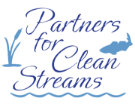 Why is PCS so salty about salt? Every winter, rain and snow wash road salt into our ditches, streams, and rivers, which degrades water habitats by adding excess chlorides. Too much salt can be toxic for invertebrates and fish. Experts agree that cutting down pollution at its sources will have a positive impact. This year, the University of Toledo, Toledo Metropolitan Area Council of Governments (TMACOG), and Partners for Clean Streams are starting a project to do exactly that.
Why is PCS so salty about salt? Every winter, rain and snow wash road salt into our ditches, streams, and rivers, which degrades water habitats by adding excess chlorides. Too much salt can be toxic for invertebrates and fish. Experts agree that cutting down pollution at its sources will have a positive impact. This year, the University of Toledo, Toledo Metropolitan Area Council of Governments (TMACOG), and Partners for Clean Streams are starting a project to do exactly that.
Did you know – a 2005 study showed that in urban streams, our water can be up to 25% saltier than sea water, just due to road salt use. Another study found that high concentrations of chlorides led to smaller populations of freshwater invertebrates, plus a reduction to their reproduction rate. The lead author behind that second study is Dr. William Hintz, an assistant professor in the University of Toledo’s environmental science department.
Dr. Hintz was recently quoted in the New York Times, saying, “There’s plenty of scientific evidence to suggest that freshwater ecosystems are being contaminated by salt from the use of things like road salt beyond the concentration which is safe for freshwater organisms and for human consumption.” So what can be done to solve this problem?
In 2021, the Ohio EPA awarded a GLRI grant to the University of Toledo, TMACOG, and Partners for Clean Streams, to work together to better understand current conditions of urban streams here and make recommendations on how to reduce road salt pollution. The project is titled “Reducing the impacts of chloride on aquatic species in the Maumee Area of Concern,” and the first of its three phases starts this winter.
Phase one focuses on developing a chloride remediation plan, and all three partners have important parts. In broad terms, UT will focus on the chloride sampling and science side of things, TMACOG will identify specific equipment upgrades to reduce salt pollution, and PCS will help coordinate project implementation plans with other organizations and government agencies.
PCS is proud to be a partner in this important project to keep our waters clean, clear, and safe. You’re sure to hear updates from us and other collaborating organizations as our salty work gets underway.
